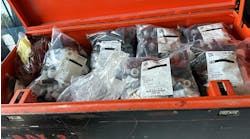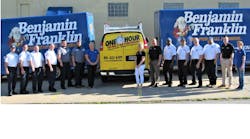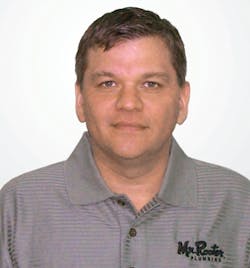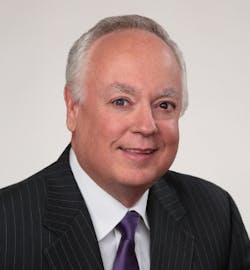Latest from Plumbing
Sponsored
Could franchising be the route to your plumbing company’s success?
CHICAGO — Even people who haven’t done much research have some idea of the benefits and the drawbacks to becoming a plumbing franchise. On the one side there are all the benefits of being part of a national brand: the name recognition, the marketing assistance, and getting to share best practices with a wider business network. On the other side are (obviously) the franchise fees, and the loss of some degree of independence.
So how do the pros stack up against the cons? What is the current state of plumbing franchising today, and how might it position your business for greater success?
For good and bad
Bruce Forthofer is the general manager for Benjamin Franklin Plumbing in Kansas City, Mo. Ben Franklin is part of a family of service companies (including One Hour Heating & Air Conditioning and Mr. Sparky electrical service) owned by Clockwork Home Services, founded in 1998 and headquartered in Sarasota, Fla. (now part of Direct Energy).
But before he became one of Ben Franklin’s “punctual plumbers,” Forthofer ran his own company, Accent Plumbing.
“I started in ’92,” Forthofer said. “In 2011, I was getting to the point where I needed to either focus my time on growing the company — and it was getting to the point where I couldn’t handle the workload — or find something else to do. I had to make a change.”
As luck would have it, he found himself in discussions with the local Ben Franklin franchise owner, who was close to retirement and actually trying to move in the opposite direction. “He was getting close to retirement,” Forthofer said, “and didn’t really want to work on the business, just in the business. I was as the point where I wanted to grow my company and get out of the truck.”
Forthofer merged his company with the existing Ben Franklin franchise and worked on the buyout. By 2015 Forthofer took full ownership. Now he has 15 people working for him and will be going up to his ninth truck by the end of the month.
While the experience has had its share of challenges, Forthofer values the franchise model for the assistance and opportunities it has provided.
“When I came in here,” Forthofer said, “I got on the phone with corporate and said ‘Hey, what kind of help do you have for me?’ because I was brand new to it. I just started talking to people and trying to get as much guidance as I could.”
And a loss of independence or control barely feels like an issue to him. “The people that think you’re going to lose control or ownership of your company, I can put them at ease,” Forthofer said. “For good and bad, it’s my company. I own it. I reap the benefits, I have to overcome the problems.
“Sure, [representatives from the corporate office] visit me twice a year… and we’ll go over the numbers and whatnot, and they’ll give me recommendations on what they think we should do, but I’ve never had anybody say, ‘Hey, you need to do this or else’… I don’t have anybody in here running this company other than myself.”
Being a franchisee has helped Forthofer manage his company’s growth. He likes the extra marketing assistance, particularly having Mike Rowe as a national spokesman. “That is hands-down one of the best things I can hang my hat on,” Forthofer said. “I’ve had guys apply for positions because they’re a Mike Rowe fan and they’ve heard his podcast and he’s mentioned Ben Franklin Plumbing.”
The parent company’s training resources have also been a big asset. Forthofer avails himself of all the management classes they offer. And all his service technicians are required to take “The Punctual Plumber,” a session that takes them step-by-step through a service call with an emphasis on soft skills.
The entrepreneurial buyer
While the owners of plumbing businesses may be researching and comparing various franchise models, the franchisors are out there actively looking for companies that are potential conversion opportunities.
That’s one of the main job responsibilities for Sam Thurman, vice president of franchise development for Mr. Rooter. In fact, at the end of the second quarter of 2017, Mr. Rooter had established new franchises in 13 locations.
Established in 1970, Mr. Rooter is the second-largest full-service plumbing and drain cleaning company in the United States with more than 200 locations in the United States and Canada and more than 100 locations internationally through master licensees. Mr. Rooter began franchising in 1974 and is a subsidiary of Dwyer Group.
Historically, Thurman said, the vast majority of new Mr. Rooter locations have been (and continue to be) conversion opportunities, in which the corporate leadership identifies a market to develop, and then identifies all the existing plumbing companies within that market. Recently, however, Mr. Rooter has started awarding some franchises to a more “entrepreneurial” buyer.
“These are typically people that are transitioning out of white collar employment; they’re highly successful career people who have experienced a career change due to a merger or consolidation,” Thurman said. “They find themselves, at a relatively young age, without a job, but they're ordinarily very well capitalized. But sometimes it can be difficult finding another job at the level they were at. And often, rather than going back into the normal corporate career, they'll leverage their capital and their experience to pursue a business ownership.”
Thurman says these white-collar franchise operators come from all walks of life, often without any previous plumbing experience.
“Many of those came to us through a resale process, meaning they bought an existing Mr. Rooter that already had the staff, the cash flow, and the equipment. And that's very attractive to these type of individuals because they have a lifestyle they need to maintain, and need to step into [an immediate cash flow generating] business.”
This trend began in 2016 and has continued into 2017.
This new type of owner greatly contrasts the traditional model of plumbing business owners, who began their businesses knowing much more about the technical side than business management.
“What we often find is that which made them a great successful technician — training, all of their experience, all of their education — had really been focused on the work itself. When they try to transition into more of an entrepreneurial role, or when they make the decision to start their own businesses, the technical skills, though important, really don't prepare them for all of the challenges they're going to face in trying to build a business around this trade,” Thurman said.
But whichever end of the business the prospective franchisee is coming from, the first step is an honest conversation about what they want their business to become.
“We often ask, ‘What are the top two or three challenges that you feel are really holding you back or keeping you from accomplishing the goals that you have for yourself, for your family, for your employees?’ Thurman said.
Discussions touch upon the nature of the Mr. Rooter business model, how the relationship with Mr. Rooter can help them with the nuts and bolts of the business, but more importantly, how it can help owners meet higher goals and expectations for themselves and for their families’ futures.
What is the end-game?
Jeff Moody is president and COO of bluefrog Plumbing + Drain, a franchisor that just launched in January of 2014. Currently, they have 15 franchisees in nine states, and Moody feels that being the up-and-comer in the plumbing franchising game is actually an asset.
“I think we have a unique name and a look that’s client-friendly,” Moody said, “For people that want to be associated with a national brand, those options may be gone with the larger franchising companies.” What to do if, for example, you’re located in San Antonio and there is already an existing Mr. Rooter?
He sees the focus on helping business owners run better businesses and becoming financially healthy. “If they have a good reputation and are running a profitable business in their area, the may have no reason to even look at franchising,” Moody said. “If they’re struggling on the business side, that’s where we can come in and really give them an advantage.”
Certainly, the opportunities for growth are there almost every direction you turn. Plumbing is famously recession-proof. “People are not going to live without hot water,” he said, “people are not going to live without their toilet flushing.” And given the historically high levels of home-ownership and falling number of skilled tradespeople, demand can only climb higher.
“What we’re all about is trying to understand, what is the end-game for our partner that’s coming on board?” Moody said. “What are they trying to accomplish?”
If the plan, for example, is to pass the business on to the next generation, then the individual company name might mean a lot to them. In which case maybe becoming a franchisee isn’t the right way to go. However, if the plan is to create a salable asset that the owner can one day walk away from, the story changes.
“We have found that brand names have a higher resale value,” Moody said. “So we try to create value within that company, in order to maximize it as a sellable asset.”
And that, Moody feels, is the key to franchising. Too many people — whatever their work may be — have their business wrapped around them, and not around systems and processes that can be replicated by other people. “That’s what we’re trying to do with bluefrog,” Moody said, “we’re trying to create a client experience where people want to do business with us and want to tell other people about us.”
And as with Ben Franklin and Mr. Rooter, a big part of that is workforce development. In addition to training programs like the bluefrog team building system, Moody wants everyone in the industry to take a step back and reconsider how plumbing is “sold” to young people when they are choosing a career.
“Plumbing as a trade is a phenomenal opportunity,” Moody said. “You can go out there and learn and master the service side. You can go and be a manager, so you’re managing other employees.” The image of a plumber as a person standing knee-deep in dirty water all day is one that has to change.
And finally, to anyone thinking about becoming a franchisee, Moody offers this advice: “Look for people who are passionate about your success, not their success. Are they focused on helping you learn and grow? It’s certainly worth the time to do the research and see if that’s a viable option for you. It doesn’t hurt to learn, and it doesn’t hurt to look.”
TERRY MCIVER | Content Director - CB
A career publishing professional, Terence 'Terry' McIver has served three diverse industry publications in varying degrees of responsibility since 1987, and has also worked in marketing communications for a major U.S. corporation.
He joined the staff of Contracting Business magazine in April 2005.
As director of content for Contracting Business, he produces daily content and feature articles for CB's 36,000 print subscribers and many more Internet visitors. He has written hundreds of news, features and contractor profile articles for CB's audience of quality HVACR contractors. He can also be found on the road, covering HVACR industry events or visiting with manufacturers or contractors. He also has significant experience in trade show planning.
Each year, Terry plays a major role in the planning and hosting of the Contracting Business "Refrigeration Roundtable," a private, idea-sharing meeting that brings together supermarket contractors and refrigeration contractors.
Steve Spaulding | Editor-inChief - CONTRACTOR
Steve Spaulding is Editor-in-Chief for CONTRACTOR Magazine. He has been with the magazine since 1996, and has contributed to Radiant Living, NATE Magazine, and other Endeavor Media properties.




